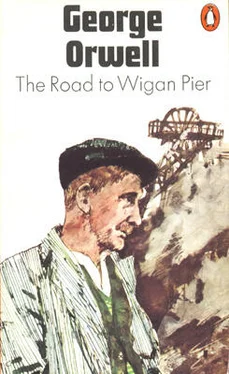George Orwell - The Road to Wigan Pier
Здесь есть возможность читать онлайн «George Orwell - The Road to Wigan Pier» весь текст электронной книги совершенно бесплатно (целиком полную версию без сокращений). В некоторых случаях можно слушать аудио, скачать через торрент в формате fb2 и присутствует краткое содержание. Жанр: Классическая проза, на английском языке. Описание произведения, (предисловие) а так же отзывы посетителей доступны на портале библиотеки ЛибКат.
- Название:The Road to Wigan Pier
- Автор:
- Жанр:
- Год:неизвестен
- ISBN:нет данных
- Рейтинг книги:5 / 5. Голосов: 1
-
Избранное:Добавить в избранное
- Отзывы:
-
Ваша оценка:
- 100
- 1
- 2
- 3
- 4
- 5
The Road to Wigan Pier: краткое содержание, описание и аннотация
Предлагаем к чтению аннотацию, описание, краткое содержание или предисловие (зависит от того, что написал сам автор книги «The Road to Wigan Pier»). Если вы не нашли необходимую информацию о книге — напишите в комментариях, мы постараемся отыскать её.
Эссе Оруэлла всегда умные, изысканно-злые и в чем-то парадоксальные.
Сейчас, как и в прошлом, многим они кажутся спорными и «скандальными». Почему? Да потому, что Джордж Оруэлл всегда современен!
The Road to Wigan Pier — читать онлайн бесплатно полную книгу (весь текст) целиком
Ниже представлен текст книги, разбитый по страницам. Система сохранения места последней прочитанной страницы, позволяет с удобством читать онлайн бесплатно книгу «The Road to Wigan Pier», без необходимости каждый раз заново искать на чём Вы остановились. Поставьте закладку, и сможете в любой момент перейти на страницу, на которой закончили чтение.
Интервал:
Закладка:
Finally, however, you will get an answer which is rather more to the point and which runs roughly as follows: ‘Yes, what you are saying is all very well in its way. No doubt it would be very noble to harden ourselves and do without aspirins and central heating and so forth. But the point is, you see, that nobody seriously wants it. It would mean going back to an agricultural way of life, which means beastly hard work and isn't at all the same thing as playing at gardening. I don't want hard work, you don't want hard work — nobody wants it who knows what it means. You only talk as you do because you've never done a day's work in your life,’ etc., etc.
Now this in a sense is true. It amounts to saying, ‘We're soft — for God's sake let's stay soft!’ which at least is realistic. As I have pointed out already, the machine has got us in its grip and to escape will be immensely difficult. Nevertheless this answer is really an evasion, because it fails to make dear what we mean when we say that we ‘want’ this or that. I am a degenerate modem semi-intellectual who would die if I did not get my early morning cup of tea and my New Statesman every Friday. Clearly I do not, in a sense, ‘want’ to return to a simpler, harder, probably agricultural way of life. In the same sense I don't ‘want’ to cut down my drinking, to pay my debts, to take enough exercise, to be faithful to my wife, etc., etc. But in another and more permanent sense I do want these things, and perhaps in the same sense I want a civilization in which ‘progress’ is not definable as making the world safe for little fat men. These that I have outlined are practically the only arguments that I have been able to get from Socialists — thinking, book-trained Socialists — when I have tried to explain to them just how they are driving away possible adherents. Of course there is also the old argument that Socialism is going to arrive anyway, whether people like it or not, because of that trouble-saving thing, ‘historic necessity’. But ‘historic necessity’, or rather the belief in it, has failed to survive Hitler.
Meanwhile the thinking person, by intellect usually left-wing but by temperament often right-wing, hovers at the gate of the Socialist fold. He is no doubt aware that he ought to be a Socialist. But he observes first the dullness of individual Socialists, then the apparent flabbiness of Socialist ideals, and veers away. Till quite recently it was natural to veer towards indinerentism. Ten years ago, even five years ago, the typical literary gent wrote books on baroque architecture and had a soul above politics. But that attitude is becoming difficult and even unfashionable. The times are growing harsher, the issues are clearer, the belief that nothing, will ever change (i.e. that your dividends will always be safe) is less prevalent. The fence on which the literary gent sits, once as comfortable as the plush cushion of a cathedral stall, is now pinching his bottom intolerably; more and more he shows a disposition to drop off on one side or the other. It is interesting to notice how many of our leading writers, who a dozen years ago were art for art's saking for all they were worth and would have considered it too vulgar for words even to vote at a general election, are now taking a definite political standpoint; while most of the younger writers, at least those of them who are not mere footlers, have been ‘political’ from the start. I believe that when the pinch comes there is a terrible danger that the main movement of the intelligentsia will be towards Fascism. Just how soon the pinch will come it is difficult to say; it depends, probably, upon events in Europe; but it may be that within two years or even a year we shall have reached the decisive moment. That will also be the moment when every person with any brains or any decency will know in his bones that he ought to be on the Socialist side. But he will not necessarily come there of his own accord; there are too many ancient prejudices standing in the way. He will have to be persuaded, and by methods that imply an understanding of his viewpoint. Socialists cannot afford to waste any more time in preaching to the converted. Their job now is to make Socialists as rapidly as possible; instead of which, all too often, they are making Fascists.
When I speak of Fascism in England, I am not necessarily thinking of Mosley and his pimpled followers. English Fascism, when it arrives, is likely to be of a sedate and subtle kind (presumably, at any rate at first, it won't be called Fascism), and it is doubtful whether a Gilbert and Sullivan heavy dragoon of Mosley's stamp would ever be much more than a joke to the majority of English people; though even Mosley will bear watching, for experience shows ( vide the careers of Hitler, Napoleon III) that to a political climber it is sometimes an advantage not to be taken too seriously at the beginning of his career. But what I am thinking of at this moment is the Fascist attitude of mind, which beyond any doubt is gaining ground among people who ought to know better. Fascism as it appears in the intellectual is a sort of mirror-image — not actually of Socialism but of a plausible travesty of Socialism. It boils down to a determination to do the opposite of whatever the mythical Socialist does. If you present Socialism in a bad and misleading light — if you let people imagine that it does not mean much more than pouring European civilization down the sink at the command of Marxist prigs — you risk driving the intellectual into Fascism. You frighten him into a sort of angry defensive attitude in which he simply refuses to listen to the Socialist case. Some such attitude is already quite clearly discernible in writers like Pound, Wyndham Lewis, Roy Gampbell, etc., in most of the Roman Catholic writers and many of the Douglas Credit group, in certain popular novelists, and even, if one looks below the surface, in so-superior conservative highbrows like Eliot and his countless followers. If you want some unmistakable illustrations of the growth of Fascist feeling in England, have a look at some of the innumerable letters that were written to the Press during the Abyssinian war, approving the Italian action, and also the howl of glee that went up from both Catholic and Anglican pulpits (see the Daily Mail of 17 August 1936) over the Fascist rising in Spain.
In order to combat Fascism it is necessary to understand it, which involves admitting that it contains some good as well as much evil. In practice, of course, it is merely an infamous tyranny, and its methods of attaining and holding power are such that even its most ardent apologists prefer to talk about something else. But the underlying feeling of Fascism, the feeling that first draws people into the Fascist camp, may be less contemptible. It is not always , as the Saturday Review would lead one to suppose, a squealing terror of the Bolshevik bogey-man. Everyone who has given the movement so much as a glance knows that the rank-and-file Fascist is often quite a well-meaning person — quite genuinely anxious, for instance, to better the lot of the unemployed. But more important than this is the fact that Fascism draws its strength from the good as well as the bad varieties of conservatism. To anyone with a feeling for tradition and for discipline it comes with its appeal ready-made. Probably it is very easy, when you have had a bellyful of the more tactless kind of Socialist propaganda, to see Fascism as the last line defence of all that is good in European civilization. Even the Fascist bully at his symbolic worst, with rubber truncheon in one hand and castor oil bottle in the other, does not necessarily feel himself a bully; more probably he feels like Roland in the pass at Roncevaux, defending Christendom against the barbarian. We have got to admit that if Fascism is everywhere advancing, this is largely the fault of Socialists themselves. Partly it is due to the mistaken Communist tactic of sabotaging democracy, i.e. sawing off the branch you are sitting on; but still more to the fact that Socialists have, so to speak, presented their case wrong side foremost. They have never made it sufficiently clear that the essential aims of Socialism are justice and liberty. With their eyes glued to economic facts, they have proceeded on the assumption that man has no soul, and explicitly or implicitly they have set up the goal of a materialistic Utopia. As a result Fascism has been able to play upon every instinct that revolts against hedonism and a cheap conception of ‘progress’. It has been able to pose as the upholder of the European tradition, and to appeal to Christian belief, to patriotism, and to the military virtues. It is far worse than useless to write Fascism off as ‘mass sadism’, or some easy phrase of that kind. If you pretend that it is merely an aberration which will presently pass off of its own accord, you are dreaming a dream from which you will awake when somebody coshes you with a rubber truncheon. The only possible course is to examine the Fascist case, grasp that there is something to be said for it, and then make it clear to the world that whatever good Fascism contains is also implicit in Socialism.
Читать дальшеИнтервал:
Закладка:
Похожие книги на «The Road to Wigan Pier»
Представляем Вашему вниманию похожие книги на «The Road to Wigan Pier» списком для выбора. Мы отобрали схожую по названию и смыслу литературу в надежде предоставить читателям больше вариантов отыскать новые, интересные, ещё непрочитанные произведения.
Обсуждение, отзывы о книге «The Road to Wigan Pier» и просто собственные мнения читателей. Оставьте ваши комментарии, напишите, что Вы думаете о произведении, его смысле или главных героях. Укажите что конкретно понравилось, а что нет, и почему Вы так считаете.












